In late 2020, we featured a list of
books that helped us make it through an extremely difficult year. This year was also pretty rough — in some of the same ways, but also in some surprising, new ones — and it is clear to us that celebrating the books that support us through hard times is a tradition we want to continue, even at the end of a good year (we can look forward to one of those soon, right?).
There are a lot ways to take comfort, but getting lost in a book — ideas distilled and set down on the page with beauty and skill — will always be our first choice. If you’re looking to make a similar choice, here are the titles that sustained us in 2021:
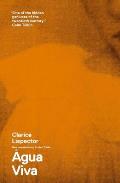 Água Viva
by Clarice Lispector
Água Viva
by Clarice Lispector
This has been a year of sitting with my own existence to an almost uncomfortable degree. Luckily, this book was here as a celebration of that — an exploration of what it means to exist in the world and how strange and wonderful it is that any of us are here at all. "I may not have meaning but it is the same lack of meaning that the pulsing vein has," our narrator says, finding the exact words I needed to hear. — Alice H.
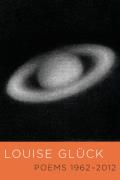 Poems 1962-2012
by Louise Glück
Poems 1962-2012
by Louise Glück
In October of 2020, Louise Glück was awarded the Nobel Prize, and like a great many casual readers of poetry, I resolved to get over my intimidation at the size of this tome and explore her work. This volume collects 11 books of poetry, and the one I most responded to is Ararat, originally published in 1992. It is about death and family and ambivalence, all themes of increasing resonance. The final poem, in particular, left me absolutely stunned. And grateful. — Keith M.
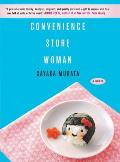 Convenience Store Woman
by Sayaka Murata (Trans. Ginny Tapley Takemori)
Convenience Store Woman
by Sayaka Murata (Trans. Ginny Tapley Takemori)
Convenience Store Woman resonated with me in ways I was not expecting. Although it is never explicitly established, I felt my lived experiences as a neurodivergent person were represented in Keiko. Like many of us, my 2021 was a year full of changes — I graduated from college, changed jobs, changed living situations... and yet it felt like everyone else was following an invisible but obvious life plan that I wasn’t aware of. I spent 2021 finding contentment in the seemingly mundane, “unimpressive” parts of my life, just like Keiko does in Convenience Store Woman.— Charlotte S.
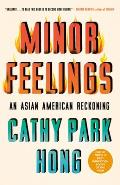 Minor Feelings
by Cathy Park Hong
Minor Feelings
by Cathy Park Hong
First, George Floyd, then the rash of slayings and assaults, then discoveries of mass graves… 2020 made it painfully evident that racial injustice is still as much an American institution as baseball and 99¢ hamburgers. Park Hong defines minor feelings as “the racialized range of emotions that are negative, dysphoric, and therefore untelegenic” which, because a proper social antidote has yet to be realized, are often turned upon the self. As an Asian American, this book spoke to me in many ways and yet also addresses the whole; we are all complicit. Hers was the brave, percipient voice that I needed during that dark year. — Aimee L.
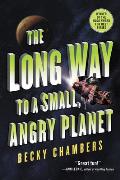 The Long Way to a Small, Angry Planet
by Becky Chambers
The Long Way to a Small, Angry Planet
by Becky Chambers
As isolating as the pandemic might have been, it has nothing on the all-consuming black void of space. The Long Way to A Small, Angry Planet by Becky Chambers helped show me that the void doesn't have to be foreboding, as long as there is someone there in the dark with you, and no matter how alone you may feel like you are, there will be people to reach out to and connect with. — Kat H.
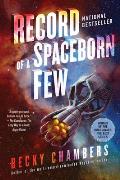 Record of a Spaceborn Few (Wayfarers #3)
by Becky Chambers
Record of a Spaceborn Few (Wayfarers #3)
by Becky Chambers
Each of the four books in Chambers's Wayfarers series is remarkable, but this one is by far my favorite. This book was a deep reminder for me of what it means to be human, how small acts of deliberate kindness can make all the difference, and that everyone's story deserves to be told. I cried on the bus while reading this book about five different times, and there's no higher recommendation I can give. — Anna B.
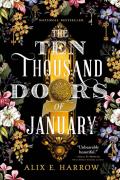 The Ten Thousand Doors of January
by Alix E. Harrow
The Ten Thousand Doors of January
by Alix E. Harrow
During another year of desperately wishing I could travel to far off destinations, escaping through magical doorways with January as she uncovered the mystery of her father's disappearance was such a delight. I found myself fully immersed in January's world, the hours flying by as I traveled with her to strange places and learned the startling truth of her past. If you enjoyed The Starless Sea or The Invisible Life of Addie LaRue, you'll love The Ten Thousand Doors of January. — Carly J.
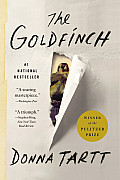 The Goldfinch
The Goldfinch
by Donna Tartt
This year, I've been working through Donna Tartt's The Goldfinch over the course of several months. To say it's helped me through 2021 is an understatement; every page of this massive novel has been both a lifeline and a comfort. Tartt has been my favorite author for a while, and this book has absolutely everything I love about her writing: an acute awareness of human emotion, transportive and rich atmospheres, characters you love and despise at the same time, and a running theme of perseverance through tragedy that's good for a cathartic COVID cry session. I can't recommend it enough. — Nicole S.
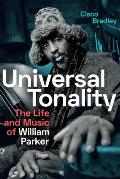 Universal Tonality: The Life and Music of William Parker
by Cisco Bradley
Universal Tonality: The Life and Music of William Parker
by Cisco Bradley
Maybe it's because I did nothing but play bass for 15 years that when I started working at Powell's, I took some time off from listening to the "new thing" and instead have been reading the "new thing." What's great, though, is when these areas of my life intersect and I can both read about and listen to some of the finest music ever recorded. Universal Tonality: The Life and Music of William Parker is one of the few books about contemporary jazz that conveys the excitement I feel when listening to the compositions of this under-appreciated bass player. (P.S. I highly recommend his recent album(s), The Migration of Silence Into and Out of the Tone World.) — Fletcher O.
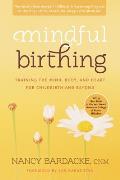 Mindful Birthing
by Nancy Bardacke
Mindful Birthing
by Nancy Bardacke
Like a few others, I had a baby in 2021 and the practices in here got me through. Breathe, be present and curious, let go of high expectations, breathe. Helpful throughout the year for more than labor pains (but definitely for those too)! — Ruth J.
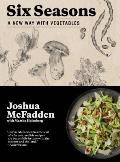 Six Seasons: A New Way With Vegetables
by Joshua McFadden
Six Seasons: A New Way With Vegetables
by Joshua McFadden
To be honest, this book got me through 2020 and 2021. This fantastic cookbook has its share of accolades and all are well deserved. His preparation ideas for vegetables are both ingenious and simple. The ingredients called for are easy to find and I found myself amazed by how he pulls everything together with just a "glug" (as he calls it) of olive oil. Wonderful, one of those cookbooks where you want to try every recipe. — David C.
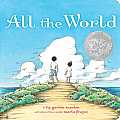 All the World
by Liz Garton Scanlon and Marla Frazee
All the World
by Liz Garton Scanlon and Marla Frazee
All the World has been a constant at bedtime in our house this year. I think I read this story with my two-year-old hundreds of times and cried more often than not. To see a family going outside, connecting with their community, sharing meals and playing together... has been both beautiful and devastating. In the last few months, my son has nearly memorized the story and now I can pretend I’m not crying while his little voice reads, “Hope and peace and love and trust / All the world is all of us.”— McKenzie W.
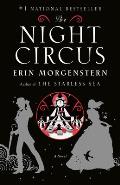 The Night Circus
by Erin Morgenstern
The Night Circus
by Erin Morgenstern
This is a book I knew I’d love, but never seemed to get around to. The pandemic didn’t help; I flat out couldn’t concentrate on books last year, and it’s only now starting to feel like my old “normal.” But my best friend and I trade off reading out loud to each other, and I could listen to her do this one all day (good pick, Hayles). Full of magic and mystery, the gorgeous, atmospheric prose translates to a wonderful spoken quality. I’m sure it’s also brilliant on the page, but I especially recommend it for a shared read-aloud. — Madeline S.
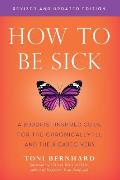 How to Be Sick
by Toni Bernhard
How to Be Sick
by Toni Bernhard
In January of 2020, I was diagnosed with fibromyalgia. Looking for something that wasn't just "think good thoughts and you'll get better," I found How to Be Sick. I read it during lockdown, and I've returned to it several times since. In chatty, friendly prose, Bernhard shares her own journey with chronic illness, and explores useful Buddhism-based practices and meditations for accepting and living well with a chronic illness diagnosis. — Deana R.
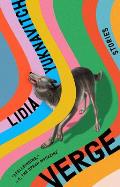 Verge
by Lidia Yuknavitch
Verge
by Lidia Yuknavitch
I need better language to talk about this book, these stories. Brokenness. Fury. Quiet. Orgasm. Triumph. Death. Impressions of the misfit life, the human experience. Lidia Yuknavitch writes with fire about the frozen souls of the lost. And we’re all lost. You have to read slowly, read again, stop and let settle. This book is short, but it’s so big I have to take time to breathe now that I’m done. — Doug C.
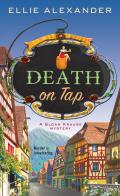 Death on Tap
by Ellie Alexander
Death on Tap
by Ellie Alexander
During this last year, I have discovered the fun and comfort of reading cozy mysteries. My favorite has been Ellie Alexander’s Sloan Krause series that starts with Death on Tap. Sloane is a beer brewer in the charming Bavarian-themed city of Leavenworth, Washington. On top of being an excellent brewer and chef, she has a talent for helping the local police chief track down criminals. I really enjoy the quirky characters, the beer culture, and the charm of Leavenworth. If you prefer bakeries and theater over breweries, check out Alexander’s Bakeshop Mysteries, set in Ashland, OR. — Jennifer H.
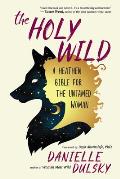 The Holy Wild: A Heathen Bible for the Untamed Woman
by Danielle Dulsky
The Holy Wild: A Heathen Bible for the Untamed Woman
by Danielle Dulsky
During the pandemic, I've thought a lot about what it means to feel wild or free. This revelatory book came to me when I needed permission to go inside and find the wild woman within. Through explorations of five female "heathen" archetypes, The Holy Wild calls us to embody often-suppressed desires for taking up space, embracing healthy sensuality, celebrating the process of aging, developing intuition, allowing righteous rage, and welcoming both community and sacred solitude. This book is a reminder that we carry wild wisdom inside us that becomes available when we acknowledge our genuine wants and needs. — Ariel K.
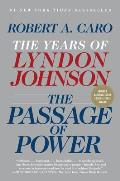 The Passage of Power (The Years of Lyndon Johnson #4)
by Robert A. Caro
The Passage of Power (The Years of Lyndon Johnson #4)
by Robert A. Caro
Lyndon Johnson has become one of my favorite presidents: favorite, not best. Because of Caro’s excellent biography, he’s one of the most fascinating. Part four, The Passage of Power, was the biggest page-turner for me. I finally got to dig into his vice presidency and presidency and all the controversy surrounding it and this only covers the first few months after taking over for Kennedy. I’ve found I have a smaller attention span for reading the last few years unless the book is at the top of its genre, like everything Caro writes. — Jeff J.
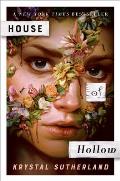 House of Hollow
by Krystal Sutherland
House of Hollow
by Krystal Sutherland
House of Hollow is a culmination of every book I wanted to write, and in turn, every book I wanted to read throughout my life, but was never able to find. I have never read a novel quite so original. It contains every strange detail I have wanted a novel to have, from other worlds and creatures to characters and how their relationships develop beautifully throughout, and still manages so many twists I never saw coming. House of Hollow is something I will never forget and will remain one of my favorite books for the foreseeable future. — Aster A.
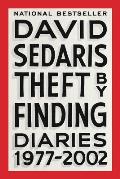 Theft by Finding
by David Sedaris
Theft by Finding
by David Sedaris
I got it out of one of those little libraries people put up in front of their houses in residential areas, which seems appropriate to the title. Reading David Sedaris’s diaries brought me into his world even more than the essays I’ve read. I learned about his life in North Carolina, in Oregon, in Chicago (he spent a lot of time at IHOP), then in New York and beyond to France and England. I got a more intimate view of his family, all of whom sound worth knowing. And now Carnival of Snackery is out, and I can go on. — Genevieve F.
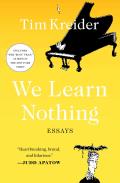 We Learn Nothing
by Tim Kreider
We Learn Nothing
by Tim Kreider
Charmingly cantankerous, Tim Kreider is a darkly hilarious writer, as witty and wise as he is vulnerable and self-effacing. In his wonderfully entertaining collection of essays, We Learn Nothing (much as he did in his follow-up, I Wrote This Book Because I Love You), Kreider ruminates and reflects on a host of disparate subjects prosaic and profound. With tough love and hard-won wisdom, Kreider makes you think and makes you feel and makes you crack up uncontrollably, quite often from the same paragraph. Come for the laughs, stay for the life lessons. — Jeremy G.
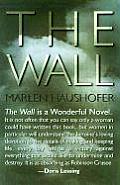 The Wall
by Marlen Haushofer
The Wall
by Marlen Haushofer
In this little-known 1960s Austrian novel, a nameless woman vacationing in an Alpine hunting lodge is trapped when a transparent wall suddenly closes her off from the outside world. Life beyond "the wall" appears to have ceased, possibly in a nuclear event. Her only companions are a dog, various cats, and a cow, all of whom become incredibly dear, fully realized characters. While apocalyptic, the novel focuses on the main character's deep interior life and her often tranquil daily existence. Her efforts to farm and function alone in the middle of the mountains are tense, yet denote her self-renewal. — Lindsay C.
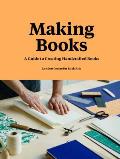 Making Books: A Guide to Creating Handcrafted Books
by London Centre for Book Arts
Making Books: A Guide to Creating Handcrafted Books
by London Centre for Book Arts
Craft helps me focus my mind and tune out the world for a while. I decided I wanted to learn bookbinding, and this book has been a fantastic guide. It goes over the tools and materials you’ll need, has clear step-by-step instructions for a number of bindings, and is beautifully designed. If you love books (and I know you do!), making them yourself feels rather special and very satisfying. — Leah B.
Editor's note: We are temporarily out of stock of this title, but eager crafters can find it here.
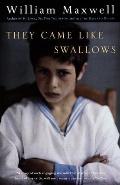 They Came Like Swallows
by William Maxwell
They Came Like Swallows
by William Maxwell
The book that felt most personal, most present, and that comforted me most was They Came Like Swallows by William Maxwell. Maxwell lost his mother to the flu epidemic in the early part of the 20th century, and this short novel shows the effects of the loss of a mother on her two sons and their father. It may seem odd to be comforted by such a sad book, but I never felt more touched by a book this year than while reading the story of this family mourning in a time of a great epidemic. — Adam P.
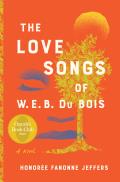 The Love Songs of W. E. B. Du Bois
by Honorée Fanonne Jeffers
The Love Songs of W. E. B. Du Bois
by Honorée Fanonne Jeffers
The Love Songs of W. E. B. Du Bois is not an easy book, not comfort food. This sweeping 200-year family saga is about racism, sexism, and the ways evils can perpetuate evils. But I choose it as the book that got me through 2021 for a number of reasons: for its luxurious, transporting storytelling, for its beautifully honed characters, for the history it illuminated for me, and most of all for the reminder that, though it sometimes seems impossible, there are ways to break the patterns that perpetuate the bad in this world. — Gigi L.
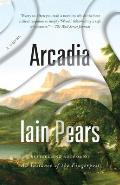 Arcadia
by Iain Pears
Arcadia
by Iain Pears
A deep meditation on the power of imagination to transcend time and space — yet light on its feet with characters and dialogue that made me long for their company. I was surprised to get to the end of this book — it came so quickly for being so big. It held so much to think about, so much to enjoy, that the pages flew by. Intricately plotted, it hides its complexity in a way that rewards careful, and multiple, readings — yet never becomes confusing or frustrating. I’m still wondering — "what just happened here?" — and anxious to try it again. — Warren B.
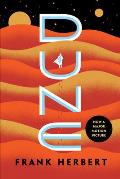 Dune
by Frank Herbert
Dune
by Frank Herbert
Of course it was Dune! It feels cliché, but reading the giant book before seeing the movie gave me a bit of low-pressure purpose to break a slump this fall. I needed to read a giant space opera that I could talk about with everyone I know, and Dune delivered all that and more. (Adventure! Spice! Gladiatorial battle! Betrayal! Intrigue! Survival tactics! Shady dealings! Sandworms! Dune!) — Michelle C.
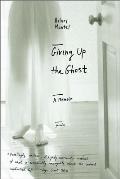 Giving Up the Ghost
by Hilary Mantel
Giving Up the Ghost
by Hilary Mantel
When I read beautiful, accomplished writing, I feel a little like I'm being safely stowed into a quiet space where all of the mess of living is being converted into meaning. Mantel's nonlinear, acerbic, mysterious memoir is tantalizing and artful, a welcome reminder of the power of good writing to bring you deep within another's experiences and allow you to emerge with a greater understanding of your own. — Rhianna W.